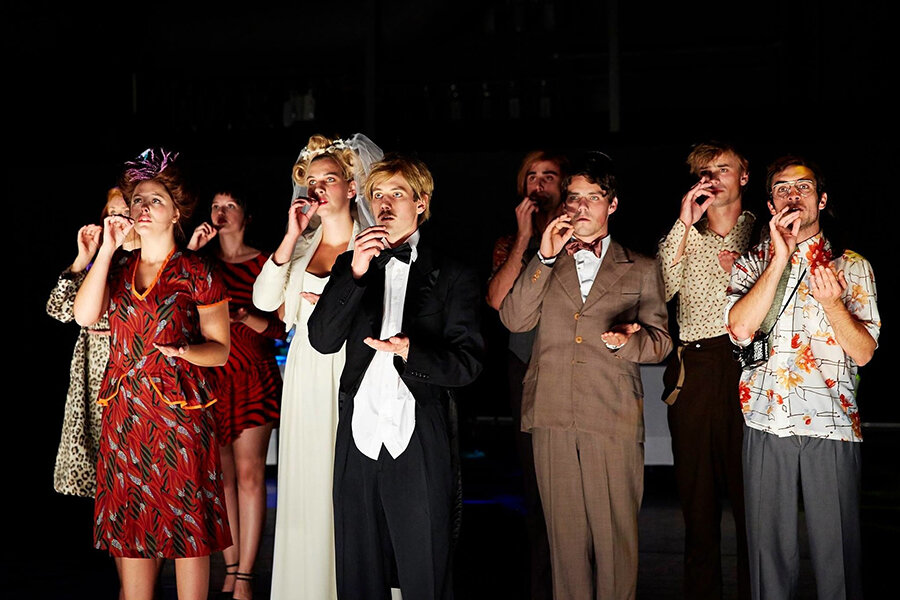
FACULTY OF THEATRE
“I regard the theatre as the greatest of all art forms, the most immediate way in which a human being can share with another the sense of what it is to be a human being.”
— Oscar Wilde
Faculty of Theatre
Stage | Film/TV | Application & Audition Preparation Program
Theatre is a highly skilled art form, teaching those who master it, a glimpse into human behaviour and the human condition. As a living art form, theatre teaches communication skills like no other art form and it embraces theoretical modes of thinking, nourished by multiple historical traditions that are put into practice in our everyday life. Studying theatre, more than anything, helps people to see different points of view. It teaches individuals how to put yourself in the shoes of others. the study of drama and theatre, combines creativity, visionary spirit, communication and leadership skills, conflict-resolution skills, learning how to adapt to circumstances – all characteristics of a rich and fulfilling life and a good recipe to succeed in any job market.
Choose a stream: Enthusiast | Pre-Professional | Professional
For more information on what stream to choose, click here to find out what type of student you are.
SEE THE COURSE SELECTIONS BELOW.

FALL COURSES 2022
Private Year-Round Courses
The Pillars of Theatre Performance
Classical
We believe that classical language training and an understanding of the historical roots of theatre is essential for every actor. Students will also be introduced to classical methodology and text, like Shakespeare for example. Classical approaches to theatre are centred around control and exactness in performance. A key strength of the classical style is the actor’s meticulous attention to the script.
Naturalism & Realism
While often confused, naturalism and realism are two theatre performance styles that have distinct schools of thought. They are distinct and separate and understanding the difference is important for any serious actor or acting student. Both sparked the move towards a more authentic form of drama on the stage. While the Stanislavski system is credited for spurring these movements, both place different demands on an actor.
Expressionism
Inspired by works of art and literature, expressionism was anti-realism. The style and acting was more deliberate, dream-like, mechanical and rhythmical. The acting style was closer linked to the theme and message of the play and the actor’s job was to not become the character but to make commentary through the character and therefore, represent and talk about the various states of the character’s mind.
Method
Arguably the most used and known styles of acting, the method approach demands that the actor completely immerses themselves in the emotional life of the character, understanding and feeling everything that the character is experiencing.
Experimental & Alternative
The demands of the actor become much more physical and thought-provoking in experimental and alternative theatre. Actors are asked to delve into the previously unexplored and more controversial territory.
Devised Theatre
A fairly new approach to theatre performance creation for actors, devised theatre relies on collaboration through improvised activities, games, and exercises. This provides a process-based approach to character and story creation.
What Makes A Great Actor?
+ Voice
Discovering and working on your natural voice is important in the pursuit of a career in acting. The voice is one of the most important actor’s tools. As such, understanding the way it works and how it connects to breath and movement, having proper breathing techniques, working on resonance, projection, diction, language and articulation is paramount to the actor’s success.
+ Character Analysis
Essential to the acting process is understanding how to breakdown your role. Bringing to surface the character details, objectives, desires and wants allows actors to focus on discovering themselves in the character.
+ Improvisation
At the core of the actor training, developling improv skills helps an actor think quick on their feet, undertand the itricacies of performance, problem solve, learn how to better tell a story and exercise imagination.
+ Movement
The body is yet another instrument that the actor uses to you embody character both emotionally and physically. It is vital that an actor understands how movement works and how to use the body in the most efficient and effortless way. Movement is a huge part of proper training for serious actors.
+ Performance Techniques
Understanding the various acting styles and techniques helps to strengthen your knowledge of your craft. Likewise, developing a positive ritual around preparing for a performance, learning a warming up routine, managing nerves and getting into the zone is crucial to the success of a performer.
+ Repertoire Development
Developing a body of work that shows contrasting sides to your abilities, best represents you and showcases your skills is difficult to do on your own, without a keen and critical eye. Having a list of monologues and scenes at your disposal, ready to take into an audition room, should be part of the preparation that an actor does.
+ Auditioning Skills
Mastering the dreaded audition is a skill-set in and within itself. An audition goes beyond performing the material itself. Learning the various components of the audition from preparing your material and your portfolio, from walking into the room, to slating, to addressing the panel, can all make, or brake, the few minutes that you have to sell yourself.
+ Scene Study
Text analysis and also learning how to go beyond the words written on the page is an important part of an actor’s job. Scene study is the art of analyzing a scene and working out what you need to do to in that scene for your character and in conjunction with your scene partners.
Mastering scene study can take many years, but there is a methodology behind it and learning that formula is essential in good training.
Coming Soon
Drama For Pre-Schoolers
GROUP:
3 - 5 Years
Advanced Acting & Scene Study
GROUP:
Adults: 18+
Acting For Film & TV
GROUP:
Adults: 18+














